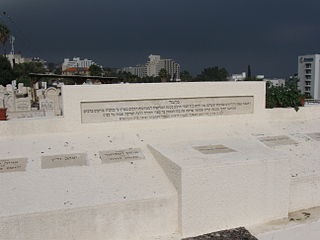 W
WThe 1936–1939 Arab revolt in Palestine, later came to be known as The Great Revolt or The Great Palestinian Revolt, was a nationalist uprising by Palestinian Arabs in Mandatory Palestine against the British administration of the Palestine Mandate, demanding Arab independence and the end of the policy of open-ended Jewish immigration and land purchases with the stated goal of establishing a "Jewish National Home". The dissent was directly influenced by the Qassamite rebellion, following the killing of Sheikh Izz ad-Din al-Qassam in 1935, as well as the declaration by Hajj Amin al-Husseini of 16 May 1936 as 'Palestine Day' and calling for a General Strike. The revolt was branded by many in the Jewish Yishuv as "immoral and terroristic", often comparing it to fascism and Nazism. Ben Gurion, however, described Arab causes as fear of growing Jewish economic power, opposition to mass Jewish immigration and fear of the English identification with Zionism.
 W
WOn June 21, 1936, Arab militants attacked a convoy of civilian buses escorted by British soldiers in Mandatory Palestine along the road from Haifa to Tel Aviv, near Anabta. Two British soldiers were killed, along with 10 or 11 Arabs in what the New York Herald Tribune termed a "major fight" in the 1936–39 Arab revolt in Palestine and The Baltimore Sun described as the "heaviest engagement" of the revolt at that point.
 W
WLewis Yelland Andrews (1896-1937) was the British District Commissioner for the Galilee during the British Mandate for Palestine. He was assassinated by Arab gunmen on his way to prayer services at Anglican Christ Church in Nazareth on 26 September 1937.
 W
WThe Jewish Settlement Police (JSP) were a division of the Notrim established in Mandatory Palestine in 1936, during the 1936-39 Arab revolt.
 W
WThe Jewish Supernumerary Police were a branch of the Guards (Notrim) set up by the British in the British Mandate of Palestine in June 1936.
 W
WThe Notrim were a Jewish Police Force set up by the British in Mandatory Palestine in 1936 to help defend Jewish lives and property during the 1936–39 Arab revolt in Palestine. The force was divided into Supernumerary Police and highly mobile Settlement Police. Members were recruited almost entirely from the Haganah.
 W
WSociety for the Defense of Palestine was a nationalist Arab militia, active during the 1936–39 Arab revolt in Palestine. The group was composed of Sunni Arab volunteers, mainly coming from Iraq and commanded by Iraqi Fawzi al-Qawuqji.
 W
WThe Special Night Squads (SNS) were a joint British-Jewish counter-insurgency unit, established by Captain Orde Wingate in Mandatory Palestine in 1938, during the 1936-1939 Arab revolt. The SNS basically comprised British infantry soldiers, together with some men drawn from the Jewish Supernumerary Police, and total unit strength was 100 by 1938. Wingate selected his men personally, among them Yigal Allon and Moshe Dayan, and trained them to form small mobile striking units. Wingate also collaborated with the Jewish paramilitary formation, the Haganah, reinforcing his unit with some of Haganah's Fosh commandos. Given British opposition to the formal creation of Jewish military units, it is not clear to what degree the authorities were aware of the exact details of Wingate's operations in this regard.
 W
WTegart's Wall was a barbed wire fence erected in May-June 1938 by British Mandatory authorities in the Upper Galilee near the northern border of the territory in order to keep militants from infiltrating from French-controlled Mandatory Lebanon and Syria to join the 1936–1939 Arab revolt in Palestine. With time the security system further included police forts, smaller pillbox-type fortified positions, and mounted police squads patrolling along it. It was described as an "ingenious solution for handling terrorism in Mandatory Palestine."
 W
WThe Tiberias massacre took place on 2 October 1938, during the 1936–39 Arab revolt in Tiberias, then located in the British Mandate of Palestine and today is located in the State of Israel.